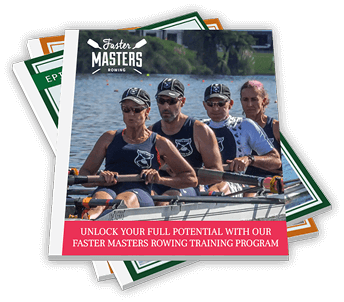Following a training plan sounds so simple. You just read the workout and do it, right?
Well - yes, but. There are many things which can get in the way of an effective training program - firstly training on the right day with the correct workout. Rowers are competitive folks and many harbor fears of missing a workout and then guilt that they need to "catch up" on the missed session. This is the most common trap you can fall into when getting your training wrong.
Our podcast explains some of the reasons why you should vary your workouts, how to plan workouts to fit your schedule and when you should not change the workout programed.
- How to follow a plan
- How and when to vary the plan
- What to do when life or the weather gets in the way of your plan
- What to do if you get sick or injured and can't train
- When it's NOT OK to vary the training plan
- What to do when your crew is on a different program.
Follow a rowing program
05:28 This Past Week - what we do to advocate for masters rowing.
Have you got a club newsletter and would you like to use masters rowing articles we've written? Get in touch
https://fastermastersrowing.com/contact-us/
Marlene's article on the oarlocks open drill is published in Rowing News Magazine
15:30 Rowing into a headwind with lumpy water is it better to keep the rate up to maintain boat speed or stay long and row slower?
Hold onto your finishes - know why you make your compromise.
23:00 Guidance on painting blades. Clean / Sand / Prime / Paint one colour.
masking tape skill is essential. Pull it off immediately you've painted. Paint the other side of the oar the next day.
29:00 How to follow a training program or training plan
You need structure to your week. Map your days and align to your training phases.
A plan is organised to build progressively - skills, fitness and mental skills.
What is the plan is set to achieve? Strengths, weaknesses or a race event and a peak?
Support this show with a donation
https://fastermastersrowing.com/register/podcast-supporter/
35:30 General preparation times of year are different from specific preparation. More flexibility is possible. But stick to the sequence.
37:00 Varying the plan (how and when). We keep sessions to 60 minutes in the Faster Masters Rowing training plan so consider your days. If you are tired or under-recovered you should vary the plan.
39:30 What to do when life or the weather gets in the way of your plan. Wait a day. If you are injured or sick, be conservative and rest.
42:00 When it's NOT OK to vary the training plan. coming into a peak event, the taper is designed to restore your muscle glycogen to its full levels. This takes 7 - 10 days. Too much work will hinder this and you won't get a peak performance.
45:00 What to do when your crew is on a different program. don't overdo the intensity if you combine programmes. Can you blend the club team boats into your programme?

